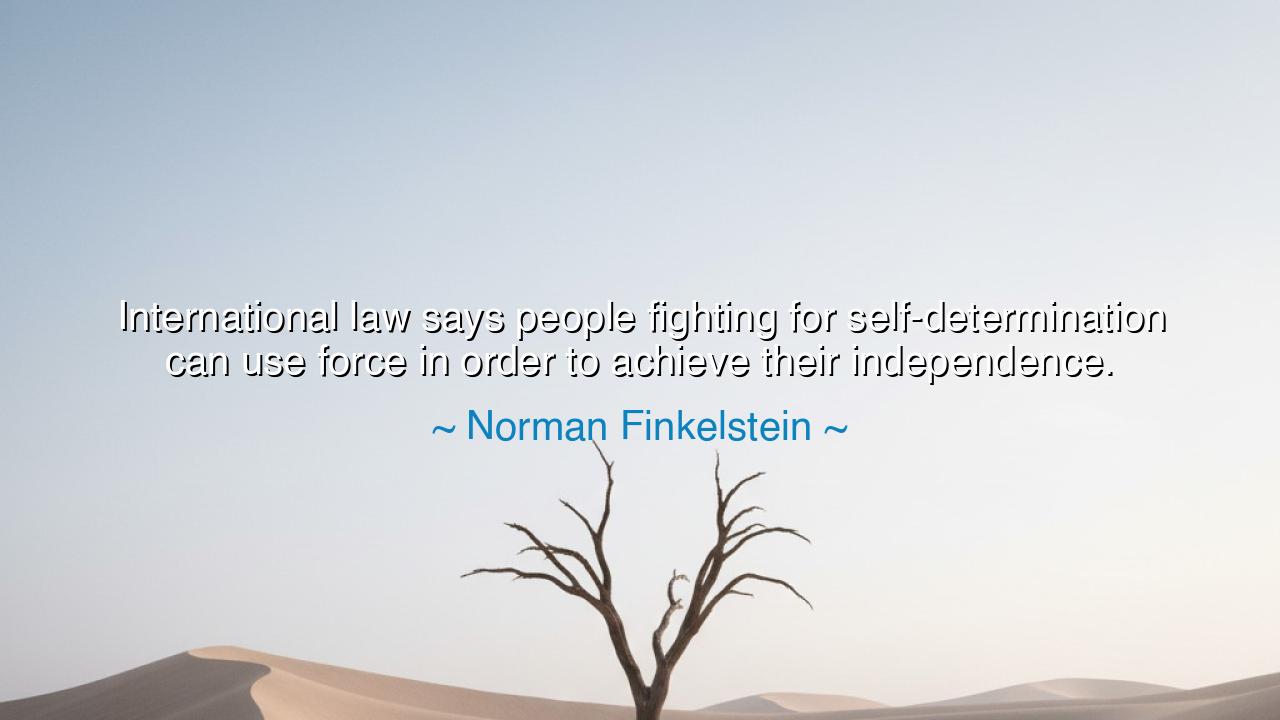
International law says people fighting for self-determination can
International law says people fighting for self-determination can use force in order to achieve their independence.






Hear, O listener, the solemn words of Norman Finkelstein, scholar and witness of our age: “International law says people fighting for self-determination can use force in order to achieve their independence.” This is not a cry for violence, but an acknowledgment of a truth as old as empire itself — that freedom, when chained too long, will eventually fight to live. The spirit of self-determination, when denied, becomes a force of nature; it cannot be legislated away nor silenced by decree. What Finkelstein speaks of is not the law of man alone, but the deeper law of existence — that every people, like every living thing, has the right to stand, to breathe, to shape its destiny.
From the dawn of civilization, independence has been born not from comfort, but from struggle. The enslaved, the conquered, the colonized — all have felt the fire that Finkelstein names. International law, in its solemn wisdom, recognizes that when all paths of peace are blocked, resistance is no crime. It is the last refuge of the oppressed. Yet this truth is both sacred and terrible, for to raise one’s hand in the name of freedom is to take upon oneself the burden of suffering, the weight of moral judgment, and the uncertainty of history’s verdict.
Remember the tale of Algeria, that land once bound in the chains of foreign rule. For one hundred thirty-two years, its people lived under domination, their language silenced, their culture dismissed. When they sought to plead for justice, none listened. When they sought reform, they were answered with bullets. And so, in their despair, they turned to the only tool left to them — force. The war that followed was fierce and tragic, a firestorm that consumed both the innocent and the guilty. Yet from its ashes rose the nation of Algeria — wounded, but free. Thus, history teaches that self-determination often demands a price no one wishes to pay, yet one that some generations must bear so that others may live in dignity.
But hear me, child of tomorrow — Finkelstein’s words are not a hymn to bloodshed. They are a warning to those who would deny justice. For when the mighty close the door to dialogue, when international law is bent to serve power rather than peace, the weak are driven to desperate means. No empire endures forever, no occupation stands unchallenged. The greater the oppression, the more certain the rebellion. It is not rebellion that breaks peace — it is injustice that poisons it first.
Yet even in struggle, the wise must remember the sanctity of life. The use of force in the pursuit of independence must never be born of hatred, but of necessity. The righteous warrior seeks not vengeance but balance; not chaos, but restoration. The ancients spoke of the Just War — one fought not for conquest, but for liberation. And so it must be: for if those who fight for freedom abandon their humanity, they risk becoming what they opposed. To win the world but lose the soul is no victory at all.
Consider Mahatma Gandhi, who showed another path — the path of resistance without violence. His weapon was conscience, his army truth. And though he shed no blood, he shook the mightiest empire of his time. His way reminds us that self-determination can also be won through moral force, if the oppressor’s heart can be made to see. But when the heart is stone and words fall into silence, then — and only then — may the oppressed take up the sword, not with pride, but with sorrow, knowing it is the final language left to them.
Thus, the lesson is this: The right to self-determination is sacred, but the road to independence must be walked with both courage and conscience. Never glorify violence, yet never condemn those who have been forced into it by the cruelty of chains. The greater duty lies upon all peoples and nations — to uphold justice so that no one need ever raise their hand in despair. For peace without freedom is not peace, but submission; and freedom without justice is but another form of tyranny.
So remember, O child of the future: the laws of nations are only as noble as the hearts that keep them. Let your voice rise for those who are silenced, let your actions defend the right of every people to stand as equals among the nations. For the truest meaning of independence is not to conquer, but to coexist; not to rule, but to be free. And when all stand free, then at last the earth will know peace not as an illusion — but as a living, enduring truth.






AAdministratorAdministrator
Welcome, honored guests. Please leave a comment, we will respond soon